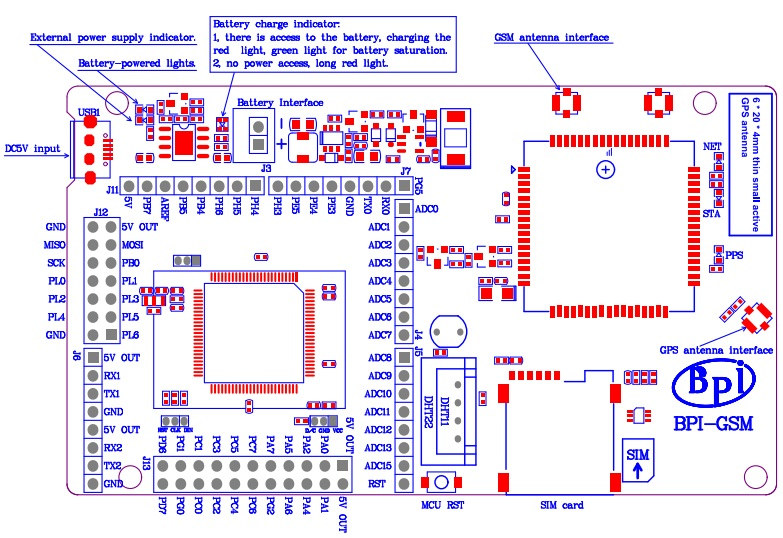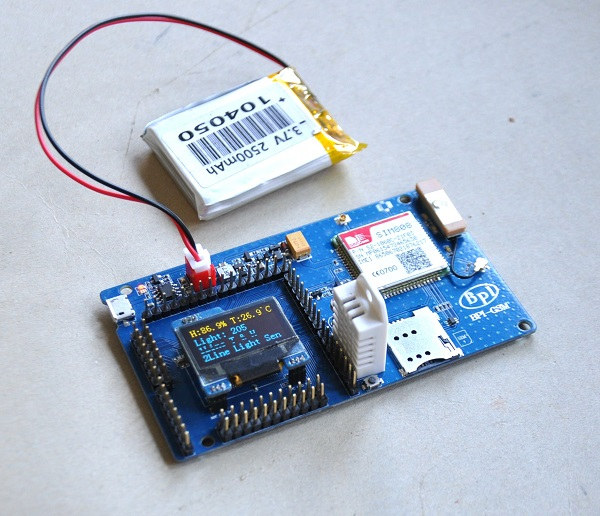Banana Pi team has come up with another board, but this time it does not run Linux or Android, as they’ve made an Arduino compatible board called BPI-GSM based on Atmel ATmega2560 MCU with a light sensor, DHT22 temperature and humidity sensor, and a GSM/GRPS & GPS module powered by a LiPo battery.
- MCU – Atmel ATmega2560 8-bit AVR MCU @ 16 MHz with 256 KB flash, 8KB SRAM, 4KB EEPROM
- Connectivity – Simcom SIM808 GSM, GPRS, and GPS module + SIM card slot +
- Sensors – DHT22 temperature and humidity sensor, light sensor
- Display – OLED display
- Expansion headers – 54x digital I/O (including 14x PWM), 16x analog input, 4x UART. Max DC current per I/O: 40 mA.
- Misc – Reset button, LEDs
- Power Supply
- 5V via micro USB port
- 3.7V LiPo battery (2,500 mAh battery included in kit)
- Dimensions – TBD

The board can be programmed in the Arduino IDE by selecting Arduino Mega board. SIM808 modem is controlled with AT commands so that might not be the most programmer friendly board there is. You can find limited documentation for the board on gitbook.io. Bear in mind that several countries have or are going to phase out 2G networks, so the GSM/GPRS connectivity may not work for long depending where you live.
The kit which includes the board, the OLED display and 2,500 mAh battery sells for $64 on Aliexpress.

Jean-Luc started CNX Software in 2010 as a part-time endeavor, before quitting his job as a software engineering manager, and starting to write daily news, and reviews full time later in 2011.
Support CNX Software! Donate via cryptocurrencies, become a Patron on Patreon, or purchase goods on Amazon or Aliexpress. We also use affiliate links in articles to earn commissions if you make a purchase after clicking on those links.






So neither running with Android nor Linux means: zero support (no community) and software most probably not working at all. Before buying such a product better have a close look in the BP1-D1 und BPI-G1 forums: http://www.bananapi.com/index.php/forum/index (to get an idea what to expect)
@tkaiser
They most probably rely on Arduino ecosystem for that one.
Adafruit has a breakout board with SIM808, and a tutorial showing how to get started: https://learn.adafruit.com/adafruit-fona-808-cellular-plus-gps-breakout/wiring-to-arduino
There may be some things to change (e.g. pin assignement), but this could be a starting point.
@cnxsoft
Most probably this is a 99% clone of something already existing and using identical pin mappings so existing software can be used. At least that’s how they did it with BPi M2+: almost all pin mappings identical to Orange Pis so software can be re-used.
The problem is that they don’t care about accurate specifications and/or documentation (it seems they do not even get the idea that this could matter for their customers). At least that’s true for all their recent products and I doubt it will change anytime soon. You can’t rely on ‘documentation’ that is mostly the result of ‘copy&paste gone wrong’
Seems expensive, considering Simcom SIM808 is <$12 (for lots of 50):
http://www.aliexpress.com/store/product/SIMCOM-GSM-GPRS-GPS-module-SIM808/709337_2037752231.html
SIM808 shield's a bit more flexible:
http://www.elecrow.com/sim808-gprsgsmgps-shield-p-1389.html